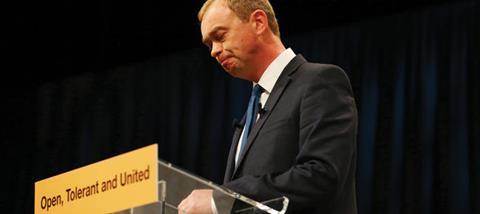
Tim Farron has got a lot of bottle.
True, we didn’t see much of it in 2015 when he visibly squirmed at being asked repeatedly about his views on homosexuality. But last night, delivering the Theos Lecture in London, Farron readily acknowledged that his response – or lack of it – had been an error.
He has clearly come back fighting. It is brave to stand up in front of hundreds of people, while being filmed by the BBC and live streamed around the world, and state your belief in the exclusivity of Christ - especially while serving as a democratically elected representative in Parliament.
It’s a message which alienates people who don’t share Farron’s faith, and he knows it.
"I believe in God. I believe that Jesus is His long promised Christ or Messiah. When Jesus says that all who believe in him shall not perish but have eternal life, and that he is the only way to the Father, I believe him."
I’ve heard him speak like this before. In fact, this is the third time in a year that I’ve been in the room when he’s proclaimed his belief. Most memorable was the particularly feisty table-thumping prayer breakfast at this autumn’s Liberal Democrat conference, where Farron argued that Jesus is the only way to God while acknowledging "that’s not a very liberal thing to say".
Farron argued that Jesus is the only way to God while acknowledging "that’s not a very liberal thing to say"
I’ll leave it to others to debate his definitions of liberalism and other political philosophies, and there’s a whole other debate to be had about whether his leadership of the Liberal Democrat party was doomed by his Christian faith, as he claims, or his failure to return a higher number of MPs at this year’s General Election.
But one thing is clear: Farron is not ashamed of the Gospel. He has a revival preacher vibe going on - an altar call wouldn’t have felt out of place – and he exercises his political duties carefully.
Although his reluctance to answer the gay question prolonged the agony, his voting record tells a story of its own and he has consistently voted in Parliament to uphold the rights of lesbian, gay and bisexual people irrespective of his personal theology.
Which matters more – belief or behaviour?
Farron isn’t the first contemporary Parliamentarian to declare evangelical beliefs publicly, or to comment on the challenges they present.
Two years ago, then Secretary of State for Wales Stephen Crabb delivered the Conservative Christian Fellowship’s Wilberforce Address and claimed that "it is easier for a politician to admit to smoking weed or watching porn, than it is to admit that they might take prayer seriously in their daily life". Seven months later, he withdrew from his party's leadership race following alleged sexual indiscretions.
Moral failings are hardly new in politics. But Farron’s particular mix of robust evangelicalism and liberal voting patterns are less familiar, which is where the belief/behaviour question becomes more interesting.
And Farron’s right to articulate his personal views, even as an elected representative, is upheld by the public. Earlier this year, ComRes tested the hypothesis that unpopular beliefs should be kept private:
If a politician believes that gay sex is a sin they should be free to express it |
64% |
If a politician believes that gay sex is a sin they should not be free to express it |
32% |
Don’t know |
4% |
ComRes also asked whether needing to know everything someone believes is necessary in order to elect them:
If a politician believes that gay sex is a sin but seeks to keep that view private, they should be allowed to hold office |
67% |
If a politician believes that gay sex is a sin then whether or not they keep that view private, they should not be allowed to hold office |
25% |
Don’t know |
8% |
Farron is courageous to state his version of the Gospel in the way he does. At a time where more people in Britain identify as 'No Religion' than identify with all religions combined, he’s in a minority. But he’s clearly found his message and seems to be enjoying preaching it. The public want authenticity from politicians, and Farron is certainly giving them that.
Katie Harrison is Director of ComRes Faith Research Centre comresglobal.com. She tweets at @harrisonkt_
Click here to request a free copy of Premier Christianity magazine


























